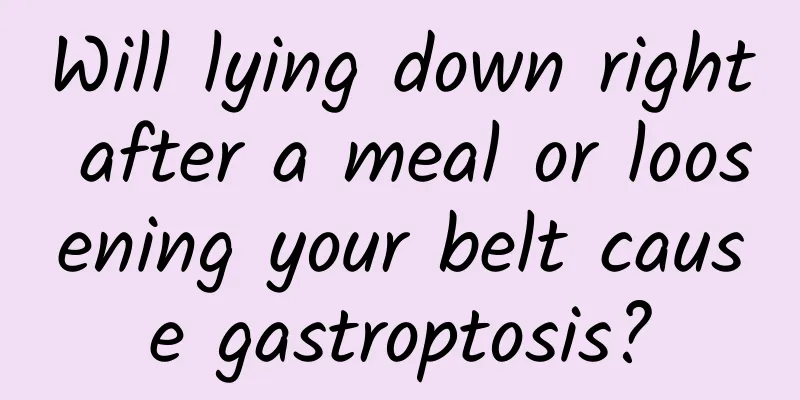Will lying down right after a meal or loosening your belt cause gastroptosis?

|
Not really. Gastroptosis refers to the abnormal drop in the position of the stomach, which is usually related to factors such as insufficient suspension of the diaphragm, decreased function of gastric-related ligaments, decreased intra-abdominal pressure, and relaxation of abdominal muscles. These factors are not directly related to the behavior of loosening the belt or lying down after a meal. The occurrence of gastroptosis is mostly due to insufficient suspension of the diaphragm, decreased function of gastric-related ligaments, decreased intra-abdominal pressure, and relaxation of abdominal muscles. Some studies also believe that it is related to gastrointestinal autonomic dysfunction. Nerve paralysis will weaken the stomach's digestive ability, and the retention of gastric contents cannot be effectively discharged into the intestines. Under the action of long-term gravity, the muscles relax, the ligaments stretch, and the position of the stomach gradually decreases. Gastroptosis does not only refer to the downward movement of the stomach, it is also accompanied by a series of symptoms, such as a feeling of fullness and discomfort after meals, as well as nausea, vomiting, anorexia, constipation, etc., and sometimes there is a dull pain in the abdomen. People with long-term gastroptosis often experience symptoms such as low blood pressure, anemia, dizziness, and palpitations. So, why does loosening the belt or lying down after a meal not cause gastroptosis? First of all, the position of the stomach is fixed by the abdominal muscles and ligaments. In the normal abdominal cavity of the human body, the position of each organ is fixed mainly by the position of the diaphragm and the activity of the diaphragm, the strength of the abdominal muscles, the thickness of the abdominal fat layer, and the fixation of adjacent organs or certain related ligaments. The diaphragm is above the stomach, and the front and lower part touches the abdominal wall muscle layer. The surrounding ligaments are fixed by stomach-diaphragm, stomach-liver, stomach-spleen and stomach-colon. This is the reason why our stomach can maintain a normal position under physiological conditions, and it has nothing to do with the belt. Of course, affected by various conditions, the stomach can move within a certain range, but this movement is only very slight and small, and does not reach the level of gastroptosis. Gastroptosis refers to the lowering of the stomach position when standing, with the lower edge reaching the pelvic cavity. Medically, it is usually defined as the lowest point of the lesser curvature of the stomach being lower than the level of the iliac crest line (X-ray examination is required to determine). In fact, gastroptosis often occurs in people with slender body shapes or those who suffer from certain wasting diseases that lead to progressive weight loss. These people have thin chests, thin chest wall fat, low stomach tension, and are prone to relaxation and elongation, resulting in gastroptosis. Long-term poor mental state is also a cause. Excessive fatigue of the brain, strong nerve stimulation and emotional fluctuations constantly act on the cerebral cortex, causing dysfunction of the cortical and subcortical centers, affecting gastric tension and leading to gastroptosis. In addition, women who have given birth more times, often overeat, exercise vigorously after meals, and people who have been engaged in standing work for a long time or stay in bed and do not move much are all prone to gastroptosis. Therefore, the key to preventing gastroptosis is to cultivate good living habits and eating habits: 1. Develop good eating habits, do not overeat, be too hungry or too full, eat small meals frequently, have a balanced diet, chew slowly, eat more soft and easily digestible food, and eat less dry, hard, indigestible, cold, hard, spicy and stimulating food; 2. Do not stand or sit for a long time, do not participate in strenuous activities or heavy physical labor immediately after eating, and take a proper walk after meals; 3. Strengthen physical exercise, do more sit-ups, push-ups and other exercises to strengthen the abdominal muscles and ligaments; 4. Maintain an optimistic attitude, regulate depression and anger, learn to relax, have a regular work and rest schedule, and get enough sleep; 5. If you already have chronic digestive diseases, you should actively seek medical treatment and follow the doctor's advice to prevent the occurrence of gastroptosis. In short, loosening your belt or lying down after a meal will not cause gastroptosis. This statement is just a "conjecture". There is no direct relationship between gastroptosis and loosening your belt. Foodies can enjoy delicious food with peace of mind, but they should also be careful not to be unscrupulous "big eaters". They should still maintain a good living and eating habits to prevent the occurrence of gastroptosis. Author | Master of Doubao Food Processing and Safety Review | Ruan Guangfeng, Deputy Director of Kexin Food and Health Information Exchange Center |
>>: "Eating Truth" | Can I eat soy sauce if I have wounds on my body?
Recommend
How long does it take to have sex with bacterial vaginitis
Bacterial vaginitis is a disease that women are v...
Sunbathing can make you taller, so why are people in the south generally not as tall as people in the north?
It is said that sunbathing helps to grow taller, ...
The silent "killer" in the human body is secretly harming parents
Long-term hypertension is a major risk factor for...
Pre-menopausal symptoms
Symptoms before and after menopause are the names...
Can pregnant women eat celery?
Lettuce is a commonly eaten vegetable. It makes e...
I had a miscarriage after doing sit-ups
The patient's uterus is located in the pelvis...
What medicine is used for vaginal ulcer pain
Vulvar ulcer is a relatively common gynecological...
Tell your children why we should study? Five stories about diligent study
Reading is the most noble thing with the lowest t...
Can you get pregnant if you have sex after your first menstrual period?
Postpartum women need at least half a year of rec...
Can postpartum stretch marks disappear?
Most female friends are very disgusted with the s...
The mother saved money to treat her child's moyamoya disease and took medicine for five years. Why did the disease recur repeatedly?
In the outpatient clinic, a mother brought her gi...
What causes vaginal itching and bleeding?
Vaginal itching and bleeding is a common symptom....
What causes vaginal bleeding after drinking?
In the past, most people who liked to drink were ...
What should I do if I have pain in my lower abdomen?
Pain in the lower abdomen of women should be the ...
Woman with back pain and weak legs
In daily life, many women are prone to back pain,...









